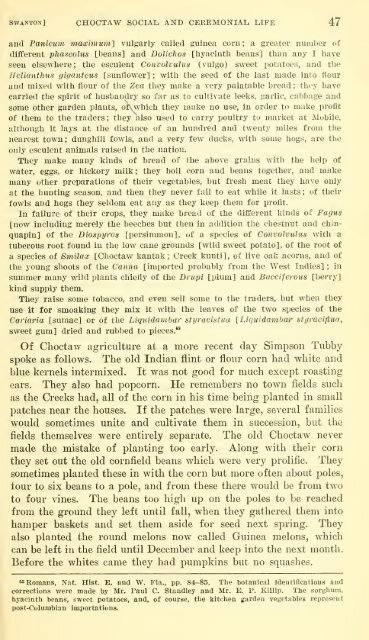siOBX; - Smithsonian Institution
siOBX; - Smithsonian Institution
siOBX; - Smithsonian Institution
Create successful ePaper yourself
Turn your PDF publications into a flip-book with our unique Google optimized e-Paper software.
SWANTON] CHOCTAW SOCIAL AND CEEEMONIAL. LIFE 47<br />
and Panicuin maximum] vulgarly called guinea corn ; a greater number of<br />
different phaseolus [beans] and Dolichos [hyacinth beans] than any I have<br />
seen elsewhere; the esculent Convolvulus (vulgo) sweet potatoes, and the<br />
Helianthus giganteus [sunflower] ; with the seed of the last made into flour<br />
and mixed with flour of the Zea they make a very palatable bread ; they have<br />
carried the spirit of husbandry so far as to cultivate leeks, garlic, cabbage and<br />
some other garden plants, of\which they make no use, in order to make profit<br />
of them to the traders ; they also used to carry poultry to market at Mobile,<br />
although it lays at the distance of an hundred and twenty miles from the<br />
nearest town ; dunghill fowls, and a very few ducks, with some hogs, are the<br />
only esculent animals raised in the nation.<br />
They make many kinds of bread of the above grains with the help of<br />
water, eggs, or hickory milk; they boil corn and beans together, and make<br />
many other preparations of their vegetables, but fresh meat they have only<br />
at the hunting season, and then they never fail to eat while it lasts; of their<br />
fowls and hogs they seldom eat any as they keep them for profit.<br />
In failure of their crops, they make bread of the different kinds of Fagus<br />
[now including merely the beeches but then in addition the chestnut and chinquapin]<br />
of the Diospyros [persimmon], of a species of Convolvulus with a<br />
tuberous root found in the low cane grounds [wild sweet potato], of the root of<br />
a species of Smilax [Choctaw kantak ; Creek kunti], of live oak acorns, and of<br />
the young shoots of the Canna [imported probably from the West Indies] ;<br />
summer many wild plants chiefly of the Drupi [plum] and Bacciferous [berry]<br />
kind supply them.<br />
They raise some tobacco, and even sell some to the traders, but when they<br />
use it for smoaking they mix it with the leaves of the two species of the<br />
Cariaria [sumac] or of the Liquidaiubar styraclntua {Liquidamhar styraciflua,<br />
sweet gum] dried and rubbed to pieces.*"<br />
Of Choctaw agriculture at a more recent day Simpson Tubby<br />
spoke as follows. The old Indian flint or flour corn had white and<br />
blue kernels intermixed. It was not good for much except roasting<br />
ears. They also had popcorn. He remembers no town fields such<br />
as the Creeks had, all of the corn in his time being planted in small<br />
patches near the houses. If the patches were large, several families<br />
would sometimes unite and cultivate them in succession, but the<br />
fields themselves were entirely separate. The old Choctaw never<br />
made the mistake of planting too early. Along with their corn<br />
they set out the old cornfield beans which were very prolific. They<br />
sometimes planted these in with the corn but more often about poles,<br />
tour to six beans to a pole, and from these there would be from two<br />
to four vines. The beans too high up on the poles to be reached<br />
from the ground they left until fall, when they gathered them into<br />
hamper baskets and set them aside for seed next spring. They<br />
also planted the round melons now called Guinea melons, which<br />
can be left in the field until December and keep into the next month.<br />
Before the whites came they had pumpkins but no squashes.<br />
^ Romans, Nat. Hist. E. and W. Fla., pp. 84-85. The botanical identifications and<br />
corrections were made by Mr. Paul C. Standley and Mr. E. P. Killip. Tlie sorghum,<br />
hyacinth beans, .sweet potatoes, and, of course, the kitchen garden vegetables represent<br />
post-Columbian importations.<br />
in

















